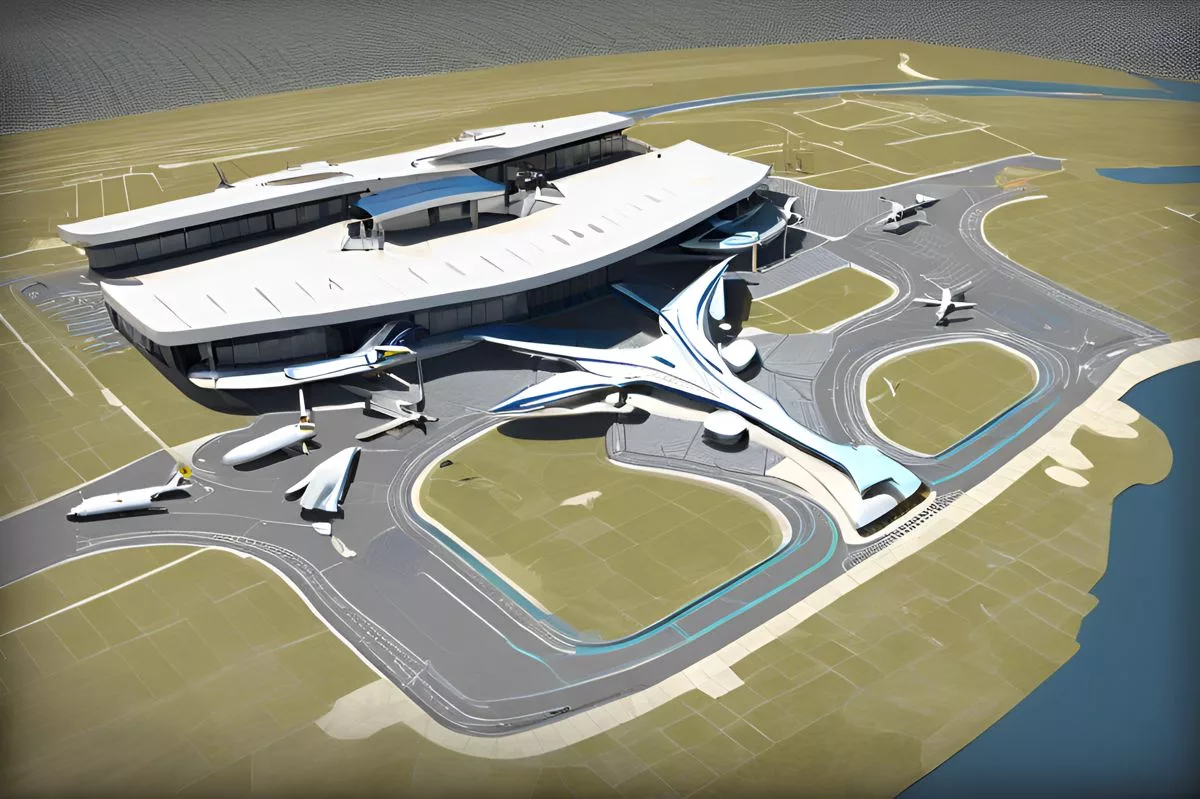Cape Town’s Cape Winelands Airport is undergoing a massive $460 million expansion, with plans to extend a runway to 3,500m and become the most eco-friendly airport in the world. The project is expected to create 60,000 new jobs and serve as a backup for Cape Town International during emergencies, reducing carbon emissions and conserving fuel. The expansion is set to transform Cape Town’s skyline, bringing economic growth and environmental responsibility to the forefront.
The Majestic Transformation of Cape Town’s Skyline: The Cape Winelands Airport Expansion
Cape Town’s Cape Winelands Airport is set to undergo a $460 million expansion, which includes extending one of its four runways to 3,500m, enabling it to accommodate larger aircraft, including Airbus 380. The airport plans to be the most “eco-friendly” worldwide and serve as a backup for Cape Town International during emergencies, thus conserving fuel and significantly slashing carbon emissions. The project is predicted to yield 60,000 new jobs, bolstering the area’s economy.
Cape Town’s Skyline: An Iconic Transformation on the Horizon
Cape Town, a city renowned for its majestic mountains and glittering coastlines, is set to undergo an impressive reinvention. The refurbishment of the venerable Cape Winelands Airport, an establishment boasting eight decades of rich history, has the potential to be an architectural wonder and a significant economic stimulant. The project is predicted to yield an impressive 60,000 new jobs, underlining the substantial impact the expansion could have on the area’s economy.
Rsa.Aero, the entity that has owned the airport since 2020, unveiled a major progression in this ambitious project in May. The company secured a 15-year agreement with Germany’s esteemed Lufthansa Group, marking a pivotal move forward in the airport’s expansion strategy. Formerly known as Fisantekraal Airport, the airport’s history includes a stint as a base for the South African Air Force following its inauguration in 1943, and later serving as a general aviation airport up until 1993 – a storied past that only enhances its charm.
A Costly Endeavour and a Promise of Transformation
While the proposed expansion comes with a hefty estimated price tag of around R7 billion, it’s a cost justified by the scale of transformation. The first stage of the project is set to be completed by 2027. Having started as a military base, the airport is primed for a metamorphosis into a top-tier transportation hub, gracing the Cape Winelands with both international and domestic passenger services.
The grandiosity of the Cape Winelands Airport expansion is in the detailed planning. The scheme includes extending one of its four runways to a significant 3,500m, enabling it to cater to larger aircraft, including Airbus 380. In addition, plans are afoot to establish a cutting-edge terminal, hangarage, fueling facilities, and a cargo processing facility. Ambitious growth plans further encompass a new heliport, hotel, warehousing, and logistics facilities.
Environmental Sustainability and Future Prospects
As the world faces ongoing environmental challenges, eco-friendly development is no longer a luxury but a necessity. The Cape Winelands Airport aims to fulfill this obligation by setting a new international standard. Nick Ferguson, Rsa.Aero’s executive managing director, has pledged to make the airport the most “eco-friendly” worldwide, functioning independently in terms of electricity, water and sewerage. Moreover, the airport plans to serve as a backup for Cape Town International during emergencies, thus conserving fuel and significantly slashing carbon emissions.
Despite the Western Cape provincial government and the City of Cape Town extending their support to the project, the company still needs to earn approval from the national Department of Transport to officially designate the airport as an international hub. Ferguson has set his sights on Lanseria, Johannesburg’s secondary airport, asserting that the Cape Winelands Airport will boast a larger, more efficient runway, thereby attracting more international flights.
With the expansion set to kick off next year and an environmental impact assessment currently underway, the Cape Winelands Airport expansion offers a peek into a future where architectural splendor coexists with economic growth and environmental responsibility, engraved in the backdrop of rich history. This daring vision promises to redefine Cape Town’s skyline, bolster its international allure, and strengthen its economic robustness.
1. What is the Cape Winelands Airport Expansion project?
The Cape Winelands Airport Expansion project is a massive $460 million undertaking to extend one of its four runways to 3,500m, enabling it to accommodate larger aircraft, including Airbus 380. The airport aims to be the most eco-friendly airport in the world and serve as a backup for Cape Town International during emergencies, reducing carbon emissions and conserving fuel.
2. What impact is the expansion expected to have on the economy?
The expansion is expected to create 60,000 new jobs, bringing economic growth to the forefront.
3. What is the history of the Cape Winelands Airport?
The Cape Winelands Airport has a rich history, including a stint as a base for the South African Air Force following its inauguration in 1943 and later serving as a general aviation airport up until 1993.
4. What are the plans for the expansion?
The expansion plans include not only extending the runway but also establishing a cutting-edge terminal, hangarage, fueling facilities, and a cargo processing facility. Ambitious growth plans further encompass a new heliport, hotel, warehousing, and logistics facilities.
5. How does the project aim to be environmentally responsible?
The airport aims to function independently in terms of electricity, water, and sewerage, making it the most eco-friendly airport in the world. Additionally, by serving as a backup for Cape Town International during emergencies, the airport will reduce carbon emissions and conserve fuel.
6. What future prospects does the Cape Winelands Airport have?
The company still needs to earn approval from the national Department of Transport to officially designate the airport as an international hub. The airport’s executive managing director has set his sights on Lanseria, Johannesburg’s secondary airport, asserting that the Cape Winelands Airport will boast a larger, more efficient runway, thereby attracting more international flights.












